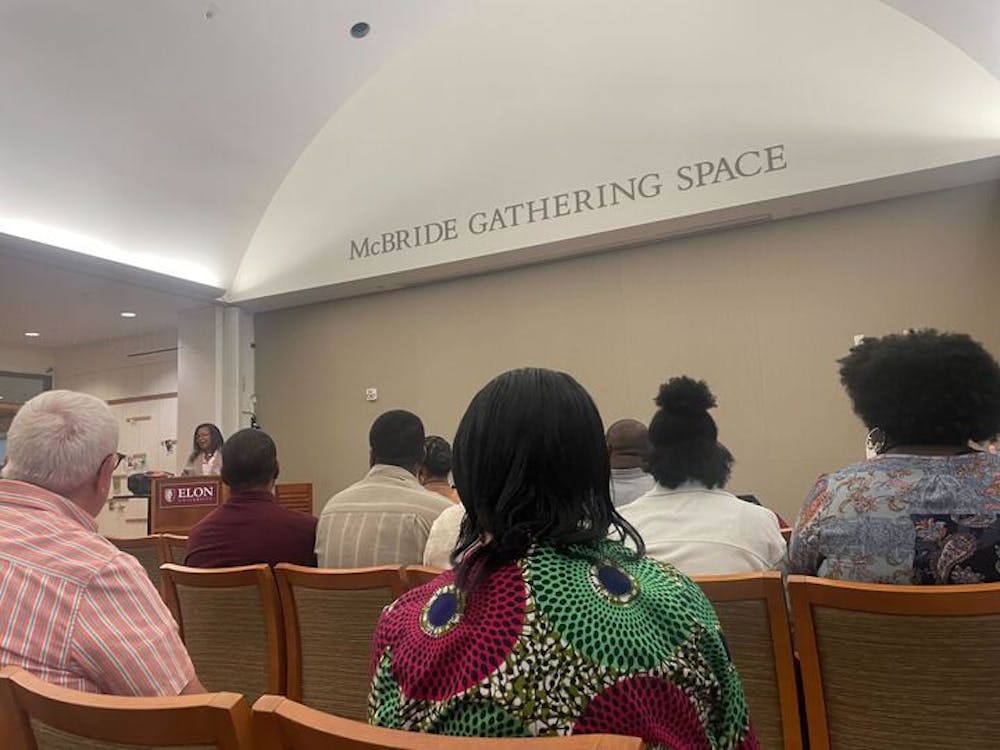Sandra Reid, a lecturer in human service studies at Elon University, said the fight for civil rights and racial equality will never end until actual reform is made.
On Oct. 3, Elon University's African & African American Studies program hosted an educational discussion through a State of Blackness Panel.
Reid said the main purpose of the panel discussion was to explore the importance of what it means to be Black today.
"Our country is trying to pull us back to that time of resistance after reconstruction – that's what it feels like," Reid said. "It's our turn to make that change."
Wendy Scott, the associate dean of special projects and professor of law at Elon, criticized this summer’s Supreme Court decision in which colleges and universities can no longer consider race in their admissions process.
Yet, Scott said universities can consider race in the admissions process if it is specifically mentioned by the student in their essay. However, she said this perspective automatically assumes that Black students would want to discuss their race — making them more one-dimensional.
“The Constitution is color blind,” Scott said. “It prohibits race-based admissions processes designed to encourage diversity in entering classes.”
Scott said there are certain compelling interests that allow the government to take race into account, but diversity isn’t one of them.
"The Supreme Court no longer views diversity as a compelling governmental interest," Scott said.
Despite the Supreme Court decision, Scott said she's thankful for those who still participate in the never-ending fight for justice.
"It's a good thing that there are people on the bench and the bar who all fight for justice and equality," Scott said."They remain vigilant in the fight for justice."
Cherrel Miller Dyce, associate professor and executive director of Diversity, Education and Inclusion at the Dr. Jo Watts William School of Education, offered a long list of possible ways faculty members could support Black students.
"They could stop wearing t-shirts… stop posting on social media about the Black Lives Matter movement," Miller Dyce said. “Start enacting policies and change and resources."
Miller Dyce also said that most school administrators are typically white men from the business industry who are more interested in the business aspect of the district rather than the students' education. Because of this, she said school administrators should begin listening in on what happens in the classroom to recognize the way racism has affected the academic future of Black students.
"They need to ask themselves a series of questions before even starting the job," Miller Dyce said. "Am I anti-Black? What are the ways anti-Black might be shown within my district?"
Miller Dyce called out American school administration members in her final statement: "If you're not ready, step aside."
Jessica Carew, associate professor of Political Science and Policy Studies, also criticized the politics around African-American studies in education: "Anti-woke to many people is actually anti-black."
"Education in the United States was not developed to be inclusive," Carew said. "All people regardless of race should have a chance to engage in some type of education."
Carew also said that laws prohibiting speech and education are currently in the process of being passed in at least four states, including North Carolina. These laws forbid employers from taking responsibility for actions committed by those of the same race or sex.
"Florida is banning 'divisive content' that 'makes children feel guilt, anguish or psychological distress' as if there aren't already black students experiencing psychological distress," Carew said.
According to Carew, there are 22 states that have had some form of these bills introduced. Out of the bills introduced, 7 of them have been passed in states such as Texas and Oklahoma.
Sheila Otieno, associate professor of Religious Studies, said the role of religion is important in the fight for civil rights.
"Religion for us is a political act," Otieno said. "It was only in religious spaces that black people had a voice."
Otieno said change and reform doesn't "begin at a protest."
"It doesn't begin at the protest or sit-in, or with a manifesto," Otieno said. "It begins in a space where I notice my humanity. These spaces bringing us down – political, legal, educational – we're being put back together in religious spaces."


